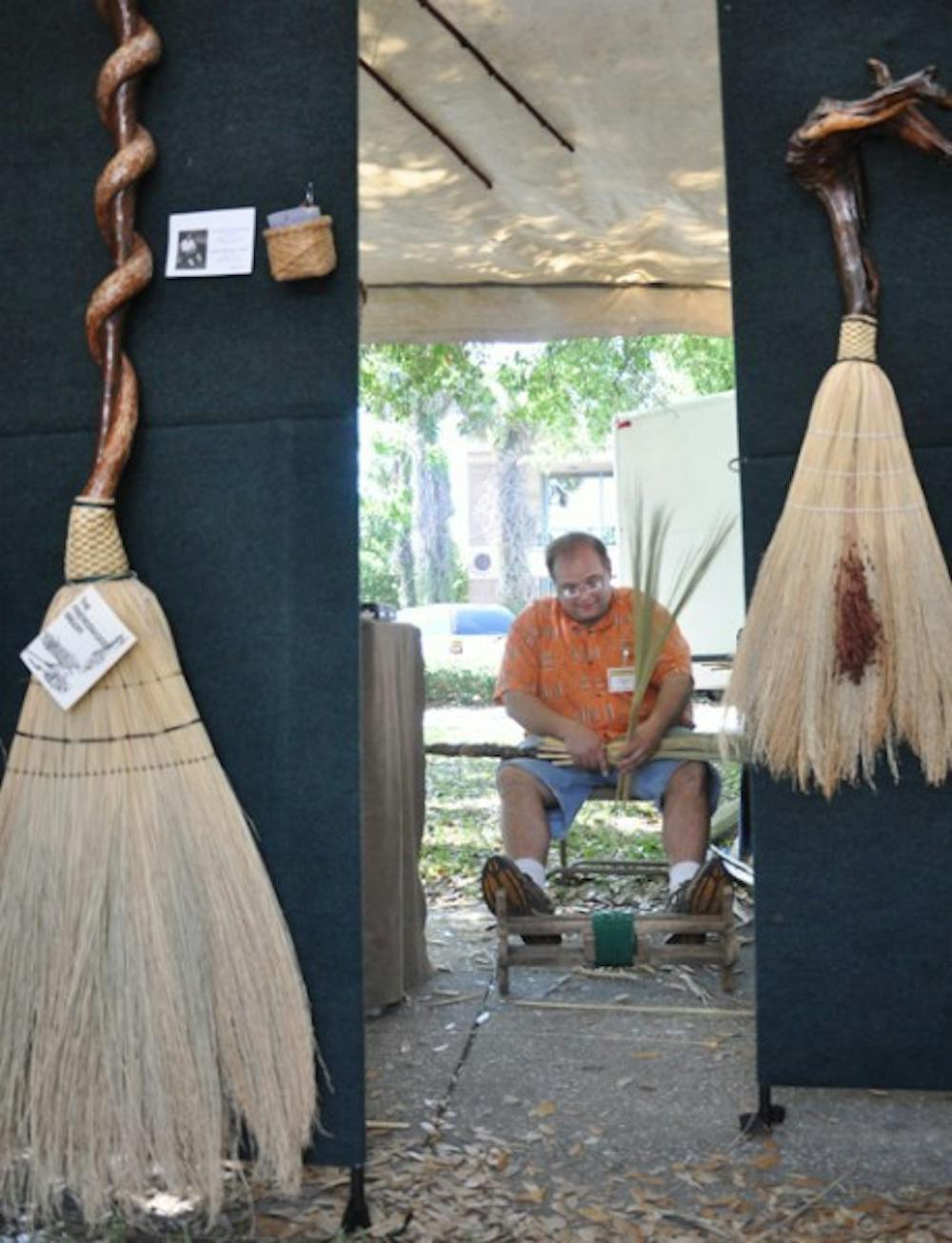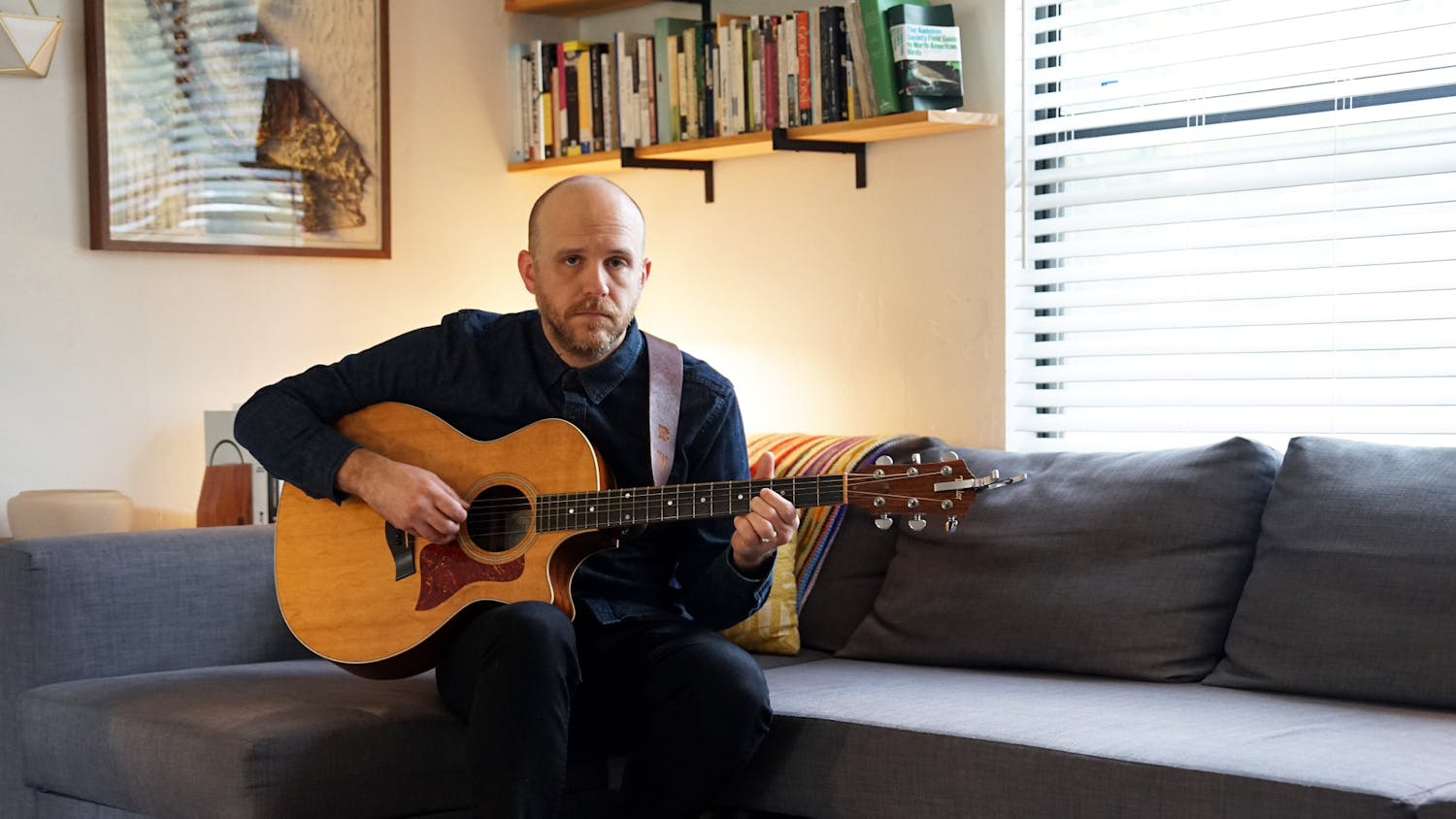He could have been an industrial engineer. Like his father, he could have worked for NASA.
Instead, Marlow Gates sits in the shade of his tent at the Santa Fe College Spring Arts Festival, wrapping twine around the end of a broom handle with a grin on his face.
Like his father, he’d rather be doing this.
At the head, most of his brooms look like any other. They’re dry, straw-looking strands that bunch together at the base.
Those handles earn him labels at festivals such as “That guy with the crazy brooms” or “the broom man.”
The thing he’s now got his hands on is a length of poplar branch with honeysuckle vine spiraled around it, shining with lacquer.
It’s beginning to look like something found in the corner of a wizard’s living room.
This, he says, is one of his more normal prototypes. Among the menagerie of broom handles lining the walls of his tent are some made with deer antlers. Others are fitted with a knot of roots for the handle.
His family’s best-known creation, the double- and triple-headed broom, earned his father a picture in National Geographic.
“Wood is like people,” Gates said. “The more it goes through in life, the more interesting it is. It just cannot be plain.”
The same could be said of Gates’ family.
In 1974, with a job at NASA and four children at home, Gates’ father, Ralph, decided to quit his job to take an apprenticeship with an Appalachian broommaker.
He packed up his family and struck out for Gatlinburg, Tenn. There, he would undergo a year of unpaid learning.
Gates, who was a few months old at the time of the move, grew up weaving brooms. Now 38, he’s a font of information for all things relating to the broom.
Ask him about his technique, and he issues an oral dissertation about the Shaker method, which dates back to the 1790s, of using a grain called broomcorn for the heads.
After his father’s death in 2004, he said he noticed a change in the brooms he made.
Gates said his father was prone to making brooms with all black handles and white bristles or with cow jawbones for handles.
Unlike his father’s brooms, his were less wild.
Gates said he still keeps his brooms interesting. One of his double brooms, the wedding broom, has two sections of bristles that appear to be holding hands. He got the idea after he — he couldn’t resist it — “jumped the broomstick.”
A standard broom of his takes about six hours to make. The more complex double or triple brooms can take up to 35 hours to make.
Those long hours, he said, are why he can sell his brooms for more than the ones you might find in Walmart.
They usually go from anywhere between $28 for a smaller one to $1,200 for his more intricate models.
He makes them for three uses. The knee-high brooms are for sweeping and adorning hearths. The thicker, midsized brooms are for floors.
For getting cobwebs, he makes long, skinny brooms, sometimes out of cane pole fishing rods.
Most of his ideas, he says, are inspired by the wood he finds around his house in the Appalachians in Leicester, N.C.
Around December, when the sap is low in the trees and the leaves are gone, he and his wife head into the mountain woods to collect handles.
He usually finds his future creations under power lines or driftwood at the beach.
The rest of the year, he hauls those broom handles around the Southeast in his Dodge Ram van to different festivals. The inside of the packed vehicle smells like hay and lacquer.
Friday afternoon, he could be found unloading his van and piecing together his tent behind SunTrust bank on Northeast First Avenue.
By Saturday morning, he’s at work in his collapsible lawn chair under the shade of the tent, tugging at the twine that holds his brooms together.
The twine runs between his legs down to a spool he turns with his tattered white tennis shoes.
He gazes down at the broom through his half-inch-thick glasses as he knots the twine with same sailor’s knot his dad taught him.
A little girl runs under the tent out of the heat of the day for a closer look at his brooms.
Her eyes widen as she looks the handles up and down.
“These brooms are cool!” she shouts, then dashes out of the tent.
Gates grins down at the knot he’s working on.
He’d rather be doing this.





